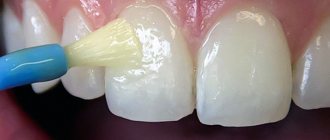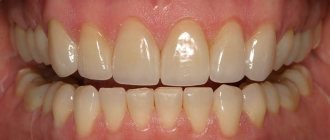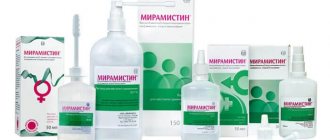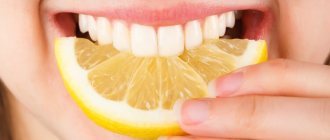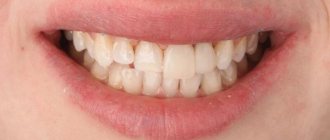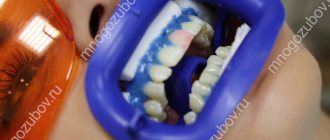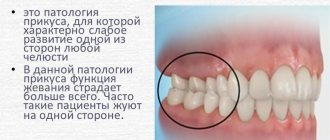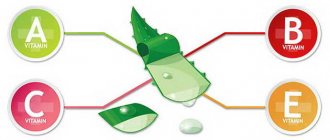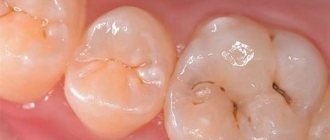Dental condition due to vitamin deficiency
Symptoms of a lack of vitamins, as well as phosphorus and calcium, which make up the hard part of the tooth and its covering, manifest themselves in the form of an unpleasant sensation of pain when biting ice cream or drinking ice water. Sometimes increased sensitivity occurs upon contact with hot food.
Symptoms of thinning enamel are the first sign of a deficiency of substances necessary for dental health.
In addition to reducing the strength of the tooth surface, other tissues of the oral cavity also suffer from vitamin deficiency:
A lack of vitamins in the body can cause periodontitis.
- Mucous membrane. Slow restoration of cells in the oral mucosa leads to stomatitis, gum inflammation, and bleeding.
- Tooth enamel. Due to a critical decrease in the thickness of the enamel, the underlying tissues become easily accessible to bacteria, resulting in the development of caries.
- Periodontal soft tissues (periodontium). Tooth mobility occurs due to a lack of vitamin C and general degeneration of the tissues surrounding the root.
If hypovitaminosis is left untreated, the symptoms intensify and worsen.
Treatment of carious teeth becomes ineffective: tooth tissue, not receiving sufficient nutrition, is constantly destroyed, without the possibility of restoration.
Minerals and beneficial elements necessary for healthy gums and teeth
In addition to vitamins, certain minerals are essential for healthy teeth and gums.
Thus, calcium and phosphorus are necessary for the formation of bone tissue and tooth enamel. And vitamin D can help absorb these elements, which promotes their penetration into dental dentin and accumulation.
Experts from the World Health Organization note that a modern adult does not receive 500 mg of calcium every day. But replenishing its reserves is not at all difficult: to do this, it is enough to eat nuts, dairy products, leafy salads, legumes and cabbage. Or you can take adult dental vitamins that contain calcium.
A mineral such as fluorine plays an equally important role. It is he who protects teeth from caries and destruction. Sufficient amounts of fluoride are found in meat, any seafood, oatmeal and buckwheat, apples and tea.
Zinc
Many people do not sufficiently understand the benefits of this microelement, but due to its deficiency, the integrity of hard tissues can be impaired. To replenish zinc in the body, you need to consume cocoa, pine nuts, pumpkin seeds, peanuts and sesame seeds as often as possible.
The development of anemia is caused by a lack of a microelement such as iron. In this case, a person may experience light colored gums, and teeth begin to crumble. Iron can be “found” in foods such as red meat, liver, buckwheat, dried fruits and legumes.
Vitamins and minerals to strengthen teeth
There are no special vitamins for teeth. But those that are useful for the normal state of the whole organism are needed by the teeth no less than by other organs:
The effect of vitamins on teeth.
- Vitamin A is required for the effective functioning of the salivary glands and the growth of mucosal and periodontal cells.
- Group B consists of several useful substances that control metabolism. B1, B6 and B12 affect the condition of tooth enamel and periodontal disease.
- Ascorbic acid is indispensable for the construction of capillary walls. The first sign of its deficiency is bleeding gums. Due to a decrease in resistance to infections, the body reacts with a deficiency of vitamin C by developing inflammatory processes. A decrease in the elasticity and volume of the periodontium is manifested by the mobility of teeth in the sockets.
- Calciferol (D3) is responsible for the metabolism of phosphorus and calcium - the main building substances of bones and teeth. Nutrient deficiency causes tooth sensitivity to hot and cold.
- Vitamin E promotes the normal functioning of the circulatory system, affecting the overall nutrition of dental tissues, the elasticity of capillaries, the resistance of the mucous membrane to bacteria, etc.
No less important are other nutrients that are active in maintaining the functioning of the nervous system, regulating the content of hormones in the blood, etc. Failures in the functioning of the endocrine and nervous systems often result in improper distribution of minerals in the body and disruption of dental nutrition.
In addition to vitamins, teeth also need minerals. The main building material of hard tissues is phosphorus and calcium compounds. The thickness of the enamel and its strength depend on their sufficient intake from food. Fluoride compounds increase the resistance of enamel to acids. No less important are the numerous minerals involved in the construction of soft tissues, nerve cells, blood vessels, etc.
The best vitamin and mineral complexes for teeth and gums
Vitamins for strengthening enamel, gums, and preventing bleeding are mainly presented in tablets, less often in effervescent form and in the form of chewable gummies for children. They should be taken in a course without exceeding dosages.
The basis for taking a vitamin complex is a poor, limited diet, the intensive growth phase, pregnancy and breastfeeding, heavy physical activity and sports.
Important! You cannot take several vitamin complexes containing the same components at the same time. Failure to comply with this rule may result in an overdose of substances or hypervitaminosis, increased adverse reactions (diarrhea, abdominal pain, allergic manifestations, etc.).
The frequency of use of medications and supplements is determined by the person's condition, the purpose (adjunct to treatment or prevention), and the agent chosen.
Asept complexes
Under this name of vitamins for teeth and gums, 3 Russian products are produced:
- probiotic complex PARODONTAL;
- Friends probiotic complex for children from 3 years old;
- vitamin and mineral complex.
The first two products strengthen general and local immunity, improve the composition of the bacterial flora of the oral cavity, and prevent the formation of dental plaque and the activity of pathogenic microorganisms. After their use, periodontal diseases, caries, and other processes caused by bacterial, fungal and viral infections are less likely to occur. Asept vitamins are a complement to basic oral hygiene.
They are used in courses for gums for 20–40 days several times a year. These supplements are a source of lactobacilli strains and vitamin D. The tablets must be dissolved until completely dissolved.
Calcium D3 Nycomed
Complex for adults and children in the form of chewable tablets containing cholecalciferol and calcium. It is used to treat conditions associated with a deficiency of these elements, regulate the metabolism of microelements in teeth and other body structures (hair, bones, nails), increase bone density and mineralization of teeth.
Calcium-D3 Nycomed is available in the form of a regular and enhanced formula with the prefix forte. The flavors of the drug are varied: mint, lemon, orange, strawberry-watermelon.
Complivit Calcium D3
Russian analogue of German calcium D3 Nycomed in orange and mint flavor for patients of any age. For very young patients it is available in the form of a suspension. To eliminate the deficiency of elements, the usual formula is used; to treat severe disorders of calcium metabolism, dental density and gum health, a reinforced form with the forte prefix is used.
Bio-Max
Vitamins for treating gums, improving capillary function, stabilizing the condition of teeth and bones, and strengthening the body. Created by a Russian pharmaceutical company for residents of Russia, taking into account the lifestyle of patients, menopausal conditions and nutrition.
The medicine includes 12 vitamins and 8 minerals. A similar action and composition is characteristic of the drug Complivit. It is distinguished by the presence of a sugar-free formula recommended for patients with diabetes.
Solgar Calcium
A quality oyster shell supplement containing a sufficient dose of calcium. It helps strengthen teeth, increase their density, protect bones and teeth from the negative effects of lead.
The advantages of the dietary supplement are convenient use (once a day) and a high dosage for the gums.
Kaltsinova
Chewable tablets for use in children. Contains retinol, ascorbic acid, calcium, vitamins D and B6. The complex composition ensures effective strengthening and protection of teeth and bones in young patients, replenishes the deficiency of these elements during active growth and development, in case of intolerance to the main sources of calcium - milk and products based on it.
Another similar complex for children is Vitamishki Calcium + vitamin D. It is produced in the form of gummy bears.
Askorutin
A cheap medicine for strengthening capillaries and eliminating bleeding from the gums associated with a deficiency of rutin and ascorbic acid. The included components reduce the fragility and permeability of capillaries.
Supplementing ascorbic acid with rutin helps protect the former from oxidation and prevent premature decay, enhancing its effect on the gums.
Alphabet Classic
It consists of useful elements that you can drink when you have gum inflammation. Unlike other multivitamin complexes, the package contains 3 types of multi-colored tablets. Each color contains a specific set of elements for better absorption and is recommended for separate use - morning, afternoon and evening.
Note! If it is inconvenient to take this multivitamin complex three times a day, you can drink 3 tablets of different colors at the same time once a day.
Separation of beneficial micro- and macroelements allows you to reduce negative interactions: according to research, it is undesirable to contain iron and calcium in one tablet, leading to a loss of effectiveness of the second.
Duovit
A complex multivitamin preparation, presented in two-color dragees in the package: minerals are in blue dragees, vitamins are in red dragees. This separation improves the absorption of the medication and reduces unwanted interactions of the elements.
Restoring the balance of vitamins and minerals
All substances beneficial for dental health enter the body with food. You can make up for a small deficiency of essential nutrients by changing your diet.
A healthy diet should include foods rich in minerals and vitamins: vegetables, fruits, meat and fish, yeast and by-products (liver, heart, etc.), vegetable oils, cereals, etc.
If there is a severe lack of vitamins and minerals, it is necessary to take concentrated doses of these nutrients. Individual advice on choosing the best drug can easily be obtained from your doctor during an examination regarding bleeding gums or enamel sensitivity.
Essential vitamins for tooth enamel
The foundation of the entire skeletal system, and, consequently, teeth, is calcium. It is worth remembering that the body constantly needs to replenish its supply of this element. However, calcium is not completely absorbed when entering the body. In order for this element to pass through better, vitamins A and D must be consumed in combination with calcium to strengthen the enamel.
Vitamin D
A deficiency of vitamin D in the body can interfere with the absorption of calcium. Even if you eat cheesecakes and cottage cheese casseroles for breakfast, lunch and dinner, this will have virtually no benefit to your bones and teeth.
With a lack of vitamin D, people usually complain of a burning sensation in the mouth, as well as a metallic taste due to insufficient saliva production. The acid in the mouth is not neutralized - the enamel is destroyed and caries rapidly develops. You can increase your vitamin D levels by regularly sunbathing. By sunbathing for 20-25 minutes a day, you can replenish the necessary supply of this element.
Valuable sources of vitamin D are also:
- fatty fish (salmon, trout, mackerel);
- beef liver;
- mushrooms;
- sunflower seeds;
- dairy products (especially butter);
- egg yolk;
- cod liver oil.
Vitamin A
Vitamin A, or retinol, actively participates in metabolic processes in the body, promotes protein synthesis, and most importantly, the formation of teeth and bones. This vitamin is responsible for the condition of the mucous membranes, including those in the mouth. A lack of vitamin A causes bleeding gums, which can cause loose teeth. In addition, consuming sufficient amounts of vitamin A increases the protective functions of the mucous membrane and improves the functioning of the immune system.
Products that supply vitamin A are:
- liver;
- fish fat;
- egg yolks;
- whole milk, cream;
- green vegetables;
- peas and soybeans;
- grapes, cherries;
- melons, watermelons;
- peaches, apples and other fruits.
Vitamin C
Another important component that helps absorb calcium, and therefore strengthen enamel, is vitamin C - this element accelerates the absorption of calcium into the blood. The sources of this component are known to everyone - these are vegetables and fruits. Bell peppers, rose hips, sea buckthorn, black currants, citrus fruits, as well as Brussels sprouts, walnuts and dill are especially rich in healing vitamin C.
For the successful absorption of calcium, in addition to vitamins, the body needs magnesium and phosphorus. To get the amount of magnesium necessary to strengthen enamel, you should include the following foods in your diet:
- buckwheat;
- cereals;
- peas;
- beans;
- bananas;
- millet.
Phosphorus-rich foods include:
- poultry meat;
- egg white;
- grain bread;
- pumpkin seeds;
- beef;
- millet;
- peanut.
However, despite the fact that phosphorus is part of bone tissue, if there is an excess of this element, it interferes with the absorption of calcium. Therefore, you should not get carried away with phosphorus-containing products.
Vitamin B
B vitamins are also important for teeth, especially vitamin B6. This element is responsible for the integrity of the mucous membranes and protects the gum tissue from periodontal disease. The vitamin is present in sufficient quantities in cereals, fish, meat, fermented milk products, and eggs.
A lack of vitamins B1 and B2 provokes unpleasant manifestations on the mucous membrane and, as a result, destruction of tooth enamel. Dry mouth appears, ulcers on the tongue, cracks in the corners of the mouth. Vitamins are contained in sufficient quantities in Brussels sprouts and offal.
Vitamin E
Vitamin E, an element that strengthens gums and also promotes rapid healing of wounds, also gives tissue stability. This vitamin is found in sufficient quantities in sunflower seeds, soybean oil, almonds, cereals and legumes, walnuts, and green leafy vegetables.
Vitamin K
Vitamin K helps reduce tissue bleeding; this element is also very important for the health of teeth and gums. The vitamin is found in abundance in spinach, soybeans, potatoes, and corn.
As we have already said, calcium is the foundation of the entire skeletal system; the human body needs constant replenishment of the supply of this substance. It is very important to consume enough calcium both as an adult and as a child. Be sure to include dairy products and cottage cheese in your daily diet, and combine them with vitamins and products that help the absorption of this material.
Thus, the list of the most useful products for tooth enamel includes:
- Dairy products
- cottage cheese, cheese, natural yogurt are natural sources of calcium. - Chicken eggs.
They contain a lot of vitamin D, which promotes the absorption of calcium. - Seafood
- sea fish, mussels, shrimp. Contains fluorides and phosphorus needed by teeth. - Hard fruits and vegetables
- carrots, celery, cucumbers, apples. Intensive chewing of fruits and vegetables promotes increased salivation, which means mechanical cleaning of teeth. - Greens
- onion, parsley, dill. Healing green juice has antibacterial properties. - Black and green tea.
These drinks contain fluorides, which have a bactericidal effect.
We hope that our recommendations on nutrition and saturation of teeth with vitamins were useful to you. And if you want to supplement your internal enamel care, try Asepta Plus remineralization toothpaste. This remedy is excellent for restoring weakened enamel and protecting gums from inflammation. The composition includes concentrated hydroxyapatite to quickly restore damaged enamel, thermal mud to strengthen it, as well as extracts of eleutherococcus and calendula.
List of vitamin complexes
Dental problems are a consequence of general hypovitaminosis, so you can look for special preparations for teeth or use any multivitamin complexes that also include minerals. Descriptions of the drugs and a short video review will help you determine the right product.
For adults
Adults require complexes with increased doses of essential minerals (Ca, P, Mg) and vitamin D3. With age, especially in women, the normal metabolism of these nutrients is disrupted, and they have to be added to the diet artificially.
Calcium D3 Nycomed is used to strengthen tooth enamel.
The following drugs are suitable:
- Calcium D3 Nycomed. Contains the correct proportions of mineral salts and vitamins, which are important for their complete absorption.
- Vitrum calcium. Contains phosphates and calcinates in an easily digestible form, enriched with calciferol.
- Kaltsinova. Thanks to the balance of essential minerals and vitamins, it helps to improve the health of the oral cavity and strengthen tooth enamel.
- DentoVitus. The need to take it is for the beauty of teeth and maintaining their health. The drug contains 6 essential vitamins and 11 minerals, without which the condition of the oral cavity is impaired.
- Centrum, AlfaVit classic and other multivitamin complexes.
For children
Vitamins for children differ from preparations intended for adults in the modified dosage of components important for teeth.
Most often, children's varieties are produced in a form that is attractive to children: tasty lozenges, gummy bears or other colored figures that the baby will willingly eat instead of simple candy:
Vitamin complex Kaltsinov is beneficial for the health of a child’s teeth.
- Kaltsinova. Colored sweet and sour tablets with fruit flavors. Each contains the daily requirement of essential vitamins and minerals. Dentists recommend the drug not only to replenish the deficiency, but also to prevent it, starting from 4 years.
- Forever Kids. The complex is created on the basis of natural extracts of vegetables and fruits, enriched with mineral salts. The tablets taste good.
- VitaMishki Calcium+. The lozenges are shaped like gelatin candies. Each bear contains a daily dose of calcium, vitamin D3 and phosphorus. This drug is often recommended solely for the prevention of calcium deficiency and related diseases (rickets, dental abnormalities, etc.). It can be combined with taking multivitamin complexes.
What are the consequences of a lack of vitamins?
The “baggage” of vitamins that a child receives in childhood, he will carry with him throughout his life.
A lack of nutrients threatens the improper formation of the body and the development of a number of diseases, which can become chronic with age. The most dangerous period is autumn and winter. In the warm season, a child can get the required amount of vitamins from fresh vegetables and fruits, but in the cold there is no such “magic” source. A common result of a deficiency of nutrients is vitamin deficiency, which affects the child’s immunity and weakens his body.
Vitamin deficiency has the following symptoms:
- skin regeneration is weakened;
- the risk of colds increases;
- the skin becomes dry and pale;
- appetite worsens;
- teeth and gums bleed;
- sleep is disturbed;
- ulcers appear on the tongue and gums;
- growth is delayed;
- vision decreases;
- jams (cracks) form in the corners of the lips;
- teeth become loose.
All this also affects the child’s behavior. He becomes capricious and lethargic, quickly gets tired and irritated, and tearfulness increases. If the child is already going to school, these symptoms are fraught with a drop in academic performance: it will be difficult for him to concentrate, the material will be poorly absorbed.
The teeth and oral cavity suffer greatly from a lack of vitamins, especially during the period of teeth change. And without this, fragile enamel, which does not receive enough useful substances, is weakened and destroyed, caries quickly develops on the teeth, and enamel hypoplasia is possible. The gums become soft and loose, the roots are not held tightly and become loose.
The result may be premature loss of baby teeth, which is dangerous for permanent teeth. If their rudiments have not yet fully formed, and free space has already appeared in the jaw, the teeth can grow crooked, weak and diseased.
Criterias of choice
The main criterion when selecting the right vitamin preparation should be the advice of the attending physician. Taking an excess amount of nutrients can cause the same harm to the body as their deficiency: for example, ascorbic acid begins to be rapidly excreted from the body with a slight overdose, and this process leads to its deficiency.
If there are pronounced signs of vitamin deficiency or hypovitaminosis, which involves the teeth, you need to undergo a standard procedure for taking a blood test for microelements.
An individually selected multivitamin complex will enrich the body with only those substances that it needs.
The average course of treatment is 1 month. When taking the prescribed tablets or capsules daily, a person’s condition normalizes if vitamin deficiency is not caused by any diseases.
After re-analysis and finishing taking medications, the doctor will recommend complex nutritional supplements to prevent the pathological condition if the diet is unbalanced and nutrients are not supplied in sufficient quantities from food.
Vitamins for teeth in food
All substances useful for teeth can be obtained not only from tablets, but also from delicious foods. A balanced diet does not include strict restrictions on treats or “harmful” foods, but it is advisable to replace most of the useless concentrated or artificially flavored foods with natural products.
The following will help enrich the body with the necessary substances:
Healthy products for teeth.
- Milk and dairy products (cheese, cottage cheese, yoghurts, etc.). They are considered not only a good source of essential calcium, but also contain it in an easily digestible form, in balance with phosphorus and magnesium. Whole milk and products made from it contain vitamin D, as well as a number of other substances necessary for teeth.
- Fatty fish, mainly sea fish, contain calciferol (D3). There is especially a lot of it in cod liver. Sea fish is rich in phosphorus salts and fluorine, which is essential for teeth (mackerel contains the most of it).
- Egg. Contains all the necessary substances due to which chicks could develop, phosphorus-magnesium-calcium complex, compounds of other microelements, proteins, fats and almost all vitamins. Fish caviar has the same feature: it is not necessary to buy expensive varieties; caviar from pollock, capelin, herring, etc. will also work.
- Nuts. Rich in calcium.
- Fresh vegetables, fruits, herbs. They contain almost all vitamins and ME, some of which are preserved during cooking.
- By-products (liver, heart, kidneys, lungs, etc.). The internal organs of animals and birds contain vitamins B, A, D3, etc.
By regularly including the listed foods in your diet, you can eat deliciously without suffering from a lack of substances the body needs.
How to take vitamins
All of the listed products must be present in the child’s diet. But it is very difficult to formulate a menu so that the baby receives a sufficient amount of one or another substance every day. This is especially true for very young children, for whom not all foods are allowed.
As an alternative, in winter, ready-made vitamin and mineral complexes for children can be used. For infants they are available in the form of a suspension (liquid droplets), for older babies - in the form of sweet chewable or suckable tablets. Typically, vitamins have a fruity smell and a sweet taste to pique a child's interest.
Advice from the editor: you must carefully study the instructions on the packaging. It is prohibited to exceed the dosage.
A pediatrician will help you choose a suitable vitamin and mineral complex, and you will need to tell him about all the baby’s health problems and his daily diet. When choosing, you need to focus on the child’s age: for each age, a specific set of vitamins and a certain amount is selected.
Watch the video in which the famous pediatrician E. Komarovsky talks about vitamins for children:
